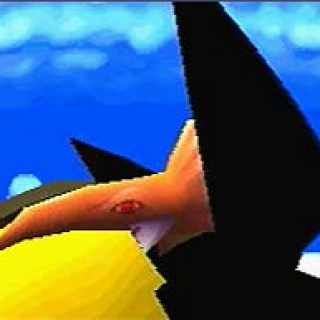

Klonoa is a user-friendly game to learn because of how seamlessly it trains you on what to and not to do.
#Klonoa door to phantomile villan how to
If an area before a boss uses one, you can be sure that it will be used in the next boss battle to give you a leg up on how to make your way through the boss area and minimize if not completely avoid damage. If you have a long circular platform, you can traverse the entire thing and then jump either on or off of it based on what’s nearby. What starts with a branching path turns into teaching you proper strategy against bosses, as the game also features the ability to walk throughout the entire lane of a structure.
#Klonoa door to phantomile villan trial
On subsequent playthroughs, you learn which paths to take, but in real-time, it’s a fine example of trial and error gameplay teaching the player as the game goes on. You have more power-ups to gain, but also more risk as they can be littered with more enemies and thus more risk when you have to leave them due to a dead end. This means that the game may lead you towards a top path with a lot of goodies that you naturally think is a better way to go - but it winds up being a catch 22. Most games of this type are straight up left to right affairs, but Klonoa mixes things up with a variety of paths to take in order to progress. This blend of platforming and light puzzle-solving continues when it comes to progressing throughout the stages. This allows you to build up point totals faster than usual. One small way to use them is to throw them from the foreground to the background and either interact with items or parts of the world. He can throw them into one another to take them out or use them as a means to throw himself upwards. Klonoa doesn’t just jump around, but he grabs enemies with a magic ring and uses it to do all sorts of things to them. The core platforming action is a bit more puzzle-infused than most, with enemies and the game’s main action still playing a part in it. This era of gaming was notorious for some of the worst VO work out there - including low-end animes and avoiding that issue at the time allows it to age better twenty years later.
/cdn.vox-cdn.com/uploads/chorus_image/image/65266085/klonoa.0.jpg)
The second reason is that with how bad English voice acting was in games as the time, it’s probably for the best that the voice work was just done in a language that didn’t exist. The first is that it builds the game’s own lore more by having a uniform language that end users only see subtitled. This is fantastic for many reasons and they all add to the experience. There’s a bit of voice work in the game too, but it’s all in a unique language. There are a ton of story beats here, unlike most platformers of the time. The titular character is adorned in bright red pants and a big blue hat and he goes from dream world to dream world to save the world. Klonoa: Door to Phantomile was a unique game for its time and one that has stood the test of time wonderfully. One concession that a lot of companies tried was a 2.5D approach - which combined the core of a 2D platformer with polygons and depth in the game world. The industry at the time, however, was shifting away from them by sheer force - especially on Sony’s PlayStation in North America. 2D platformers still had a lot of life in them, as the ever-growing popularity of the genre in today’s indie realm shows. The late ’90s were one of the best eras of gaming so far, with a plethora of classic franchises beginning and the rise of the third dimension. You’ll see both good and bad souls unearthed every month as we search through the more… forgotten…parts of history. Inside, we’ll be digging up games that have long been without a pulse. Watch your step, for you’ve just entered the Graveyard.


 0 kommentar(er)
0 kommentar(er)
